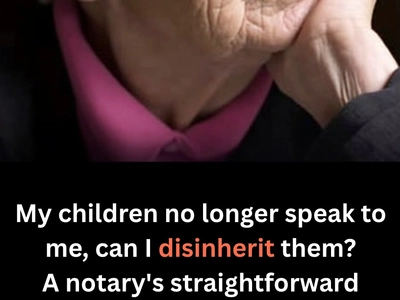Inheritance: My children have turned their backs on me, can I exclude them from my inheritance?
Family relationships are not always smooth. Some children cut ties with their parents, stop visiting, and sometimes remain silent for years. For parents, this silence can feel like rejection, and it often leads to painful questions. One of the most common is: If my child has abandoned me, can I cut them out of my will?
In some countries, such as the United States or the United Kingdom, parents have wide freedom to decide who will inherit their estate. They can leave everything to one child, a friend, or even to a charity, while leaving another child nothing. But France is different. French inheritance law is strict, protective, and leaves little room for parents who want to disinherit their children.
The short answer is: No, you cannot completely disinherit your children in France. The law protects them. But there are still strategies you can use to influence how your wealth is distributed.
To understand why, let’s look step by step at how inheritance works in France, what limits exist, and what options parents still have.
1. The Core Principle: Children Are “Reserved Heirs”
In France, the law treats children as reserved heirs. This means that no matter what the parent writes in a will, each child is guaranteed a minimum share of the inheritance. This system is designed to prevent unfair treatment and to ensure family property stays within the bloodline.
The legal share children must receive is called the “reserved portion” (la réserve héréditaire). Here is how it works:
- If you have one child, that child must receive at least half of your estate.
- If you have two children, together they must receive two-thirds of your estate (split equally).
- If you have three or more children, they must share three-quarters of your estate equally.
The remaining part of your estate is called the “available portion” (la quotité disponible). This part is flexible—you can leave it to anyone you choose, whether it’s another child, a relative, a friend, or even an organization.
For example:
- A parent with two children has an estate worth €300,000. The children must together receive €200,000 (two-thirds). The remaining €100,000 is the available portion, which the parent can give to whomever they wish.
This strict system is what makes France very different from countries like the U.S., where parents can decide to leave one child everything and the other nothing.
2. Can Silence or a Broken Relationship Justify Disinheritance?
Many parents feel hurt when a child distances themselves. Some children may disappear for months, years, or even decades. Others may maintain contact but remain cold and distant. Unfortunately, under French law, this alone is not a valid reason to disinherit a child.
The law is clear: a child’s right to their reserved portion does not depend on affection, attention, or the quality of the parent-child relationship. Even if a child has been absent from your life, they will still inherit.
The only exception is when the child is legally declared “unworthy to inherit” (indignité successorale). But this is very rare and only applies in extreme cases listed in Article 726 of the French Civil Code.
3. Legal Grounds for Declaring a Child “Unworthy”
Declaring a child unworthy to inherit is serious and requires legal action. It is not automatic, and a judge must make the decision.
Some examples of unworthiness include:
- If the child has been convicted of attempting to kill or harm the parent.
- If the child has been guilty of serious physical abuse or mistreatment.
- If the child has falsely accused the parent of a major crime, with the intention of causing harm.
In these situations, the court can strip the child of their inheritance rights. But the parent must go to court, provide strong evidence, and win the case. Simply having no contact, arguing, or even being treated with disrespect does not qualify.
This means that for most parents, disinheriting a child completely is not possible.
4. Alternatives: How Parents Can Adjust Inheritance
Even though the law does not allow full disinheritance, parents still have tools to influence how their estate is divided. Let’s look at the main options.
a) Use the Available Portion
The most straightforward option is to use the available portion of your estate. This is the part of your wealth that is not protected by the reserved share. You can freely decide who receives this portion:
- You could leave it to one of your children if you feel they deserve more.
- You could give it to a grandchild, a sibling, or a friend.
- You could donate it to a charity, foundation, or other cause you care about.
This gives you some flexibility, even though you cannot remove your children from the inheritance entirely.
b) Life Insurance Policies
In France, life insurance (assurance-vie) is a very popular tool for inheritance planning. Money placed in a life insurance contract can be passed directly to a chosen beneficiary. This transfer happens outside the usual inheritance rules, which means the money does not count toward the reserved share.
For example, you could name a close friend, a grandchild, or even a caregiver as the beneficiary of your life insurance policy. The sums must be considered “reasonable” compared to your total estate—otherwise, heirs could challenge the decision in court. But overall, life insurance is one of the most effective legal ways to direct part of your wealth outside of the strict inheritance system.
c) Gifting During Your Lifetime
Parents can also make donations during their lifetime. This means giving away property, money, or assets while still alive. These gifts will generally be counted toward the inheritance when the estate is divided, but they allow parents to reward specific children or individuals earlier.
Some special types of donations, such as donation-partage (a partition gift), allow parents to distribute assets in advance in a way that is more difficult to challenge later.
d) Creating a Will with Special Instructions
While you cannot cut out your children completely, you can use a will to make sure the available portion goes where you want it to. For example, you could give a particular heir the family home, certain valuables, or special rights.
You could also use tools like usufruct and bare ownership (démembrement de propriété), which allow you to split ownership rights. For instance, one person can have the right to use a property during their lifetime, while another person becomes the ultimate owner after their death.
e) Consulting a Notary
Because inheritance rules in France are complex, the safest way to plan is by consulting a notary. A notary can explain the options, help prepare documents, and ensure that your decisions respect the law. They can also suggest strategies that fit your situation, such as setting up family agreements, managing shared property, or using specific legal tools.
5. Why France Protects Children’s Rights So Strictly
It may seem unfair that parents cannot freely decide who inherits their estate. But the French system is rooted in a long history of protecting family bonds and ensuring equality.
In older times, family land and property were seen as belonging to the whole lineage, not just the individual. This tradition led to the modern rule that children cannot be completely cut off. The law reflects the idea that inheritance is not only about rewarding affection but about maintaining family solidarity across generations.
While this system can feel restrictive for parents who are estranged from their children, it also prevents abuse and ensures that vulnerable heirs are not left with nothing.
6. Practical Example Scenarios
To better understand, let’s look at a few realistic examples:
Case 1: One Child, Estranged
Marie has one son, Paul, who has not spoken to her in 15 years. Her estate is worth €200,000. Even if she writes a will leaving everything to her best friend, the law requires that Paul receive €100,000. The remaining €100,000 can go to the friend.
Case 2: Two Children, Unequal Relationship
Jean has two daughters. One visits him daily, the other never calls. His estate is worth €300,000. The two daughters must share €200,000 equally, meaning €100,000 each. But Jean can leave the remaining €100,000 entirely to the daughter who supports him.
Case 3: Life Insurance Strategy
Lucie has three children but is particularly close to her youngest, who cares for her. Her estate is worth €400,000. The children must share €300,000 equally, €100,000 each. However, Lucie also takes out a life insurance policy of €100,000 naming her youngest child as the sole beneficiary. This sum goes directly to the child, outside of the inheritance, giving them extra support.
7. Emotional vs. Legal Reality
Inheritance is not only a legal matter; it is also deeply emotional. When parents feel abandoned by their children, the desire to cut them out of the will often comes from hurt and disappointment. Unfortunately, the law does not take emotions into account.
This can create tension. Sometimes, siblings resent each other when one receives more through the available portion or through life insurance. It is important to communicate intentions clearly, preferably with the help of a notary, to avoid future conflicts.
8. Conclusion: No Full Disinheritance, But Some Flexibility
To sum up:
- In France, children are protected heirs and cannot be completely disinherited.
- The reserved portion guarantees them a share of their parent’s estate.
- Only in rare and extreme cases of unworthiness can a child lose their rights.
- Parents still have tools to adjust inheritance, such as using the available portion, life insurance, gifts, and notarial strategies.
While this system may frustrate some parents, it is designed to ensure fairness and protect family property across generations. If you are facing a complicated family situation, the best step is to consult a notary who can guide you through the legal options.






